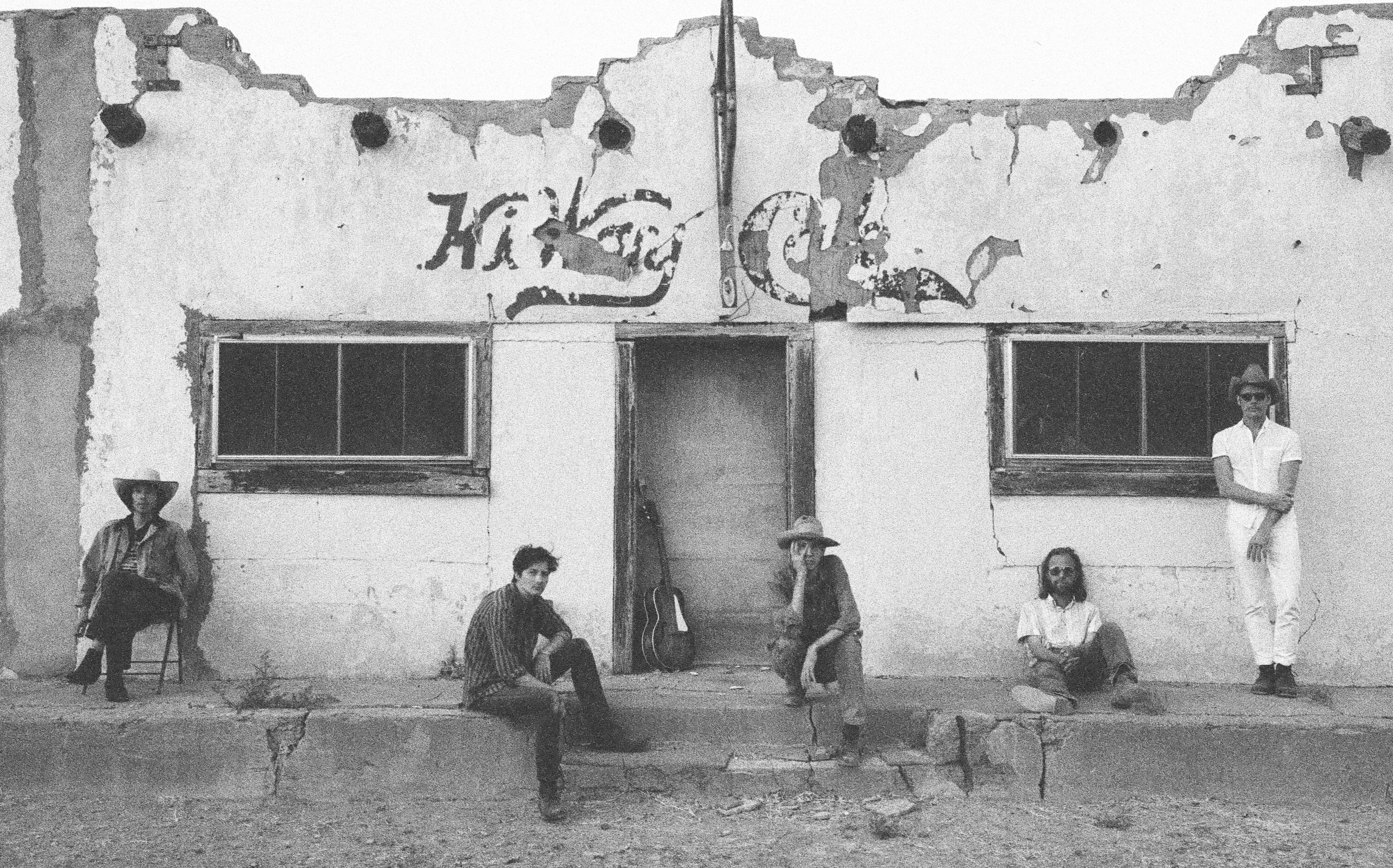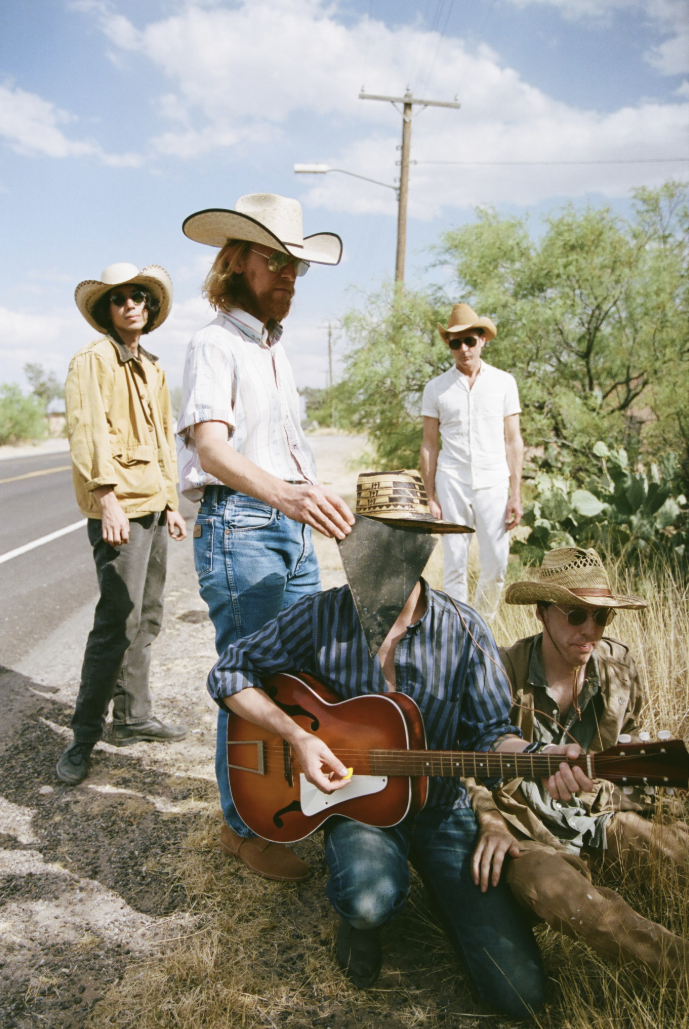Deerhunter: Postcard From the Slipstream

Deerhunter’s Bradford Cox rejects distorted visions of the past—and future.
Bradford Cox feels more privileged than most for one good reason. “If I have one privilege, one elitism that I have over anyone else, it’s that I have no interest in schedules or time—I do what I want to do when I feel like it,” the Deerhunter frontman says on a cold December afternoon, while camped out in New York’s Ace Hotel.
Cox’s decision to live without a schedule reinforces his firm belief that neither the past, nor the future, are of any concern. It’s also why Deerhunter’s eighth studio album, Why Hasn’t Everything Already Disappeared?, is a daring compositional feat firmly rooted in the now. The album clips along to a groove of synthesized sci-fi strings and stream-of-consciousness poetry while managing to explore some heady ideas about time throughout a tight, 37-minute collection of songs that are catchier than they should be. It’s a cinematic mirror reflecting a bleak wasteland, a document of a decaying world that stands outside of time.
Cox calls the single “Element” an “elegy for ecology (a landscape done in toxic watercolors)” but refuses to get sentimental during the song, instead singing: “The wind was stained/ Orange clouds laid out for a toxic view/ Of endless time.” He describes album highlight “Futurism” as a postcard from “the slipstream,” a phenomenon he can best explain by referencing the end of the last season of Twin Peaks, when the audience realizes that time is not linear while continuing to grasp at that nonexistent timeline.
Cox reflects on his past with a reluctant disdain for looking back. As a kid, he embraced nostalgia through the discovery and celebration of old music. Now, he seldom ever listens to old Deerhunter albums, save for when he’s preparing to tour.
“Now that I have my own life, I’m old enough to have my own nostalgia,” says Cox. “When you’re young, you have a borrowed nostalgia, a shared nostalgia. I think you have to keep yourself mainly in the present because there’s too much overwhelming information in the past and it tends to want to ambush you. A lot of it exaggerates its own meaning and it can be deceitful. Things that you’ve experienced will have you think that they formed you, when reality is a random collage of the past, present and future.”
However, he recalls one formative childhood experience that remains undistorted. In 1993, when he was only nine years old, Cox—cracked out on the energy drink and chocolate-covered espresso beans that he got at a nearby Jittery Joe’s coffee shop—darted into Athens, Ga.’s Low Yo Yo Stuff Records for the first time while his mother sat in a salon getting her hair done.
“I spilt a Jolt Cola all over The Fall section—all the CDs in their bins—a little card catalog thing, and my mom had to buy them all because I ruined them,” Cox remembers. “She said, ‘I spent all this money on this,’ so we took the CDs, I cleaned them off and listened to them because I didn’t have any. So those were my CDs. I accidentally inherited 12 Fall CDs.”
Those albums served as an inspiration for Cox’s earliest songwriting. Popping into Athens’ Atomic Music Hall in 1994, Cox met the influential noise band Harvey Milk and asked them if he could play a show. When the band asked Cox what type of music he was into, he namedropped The Fall. The play worked, and Harvey Milk backed Cox during his first gig when he was only 10 years old.
In fact, stumbling upon The Fall’s entire catalog not only helped Cox land his first gig, but it also served as the start of his self-taught artistic education. “Since I was a child, if I found something shiny, I gravitated toward it,” he says. “Art books are typically shiny to some degree, and I like what I like. I cannot work without aesthetic stimulation. I was always doing exactly what I am doing now.”
True to his word, a trio of newly acquired art books sits on his table at The Ace, reflecting where Cox’s head is these days—there’s a 50-year retrospective of American painter Cy Twombly, another book documenting the work that Asger Jorn (a Danish avant-garde painter/writer and founding member of The Situationist International movement) produced during his time in Munich and another book collecting structures designed by the modernist architect Le Corbusier.

You don’t need an art history lesson to draw a tether between the work of these past masters and the ideas on Why Hasn’t Everything Already Disappeared? Cox’s lyrics and liner notes explain his approach to these songs through a language of odd pigments and compositional techniques.
“All of my records are films,” he says. “And, a lot of times, when I think of visual art, there is a cinematic quality to it. Willem de Kooning, Cy Twombly and Asger Jorn—I view their work as cinematic. Not necessarily literally, but I view movement in them. Rhythm.”
Like Jorn, Cox’s output challenges the expectations of an artist working in popular mediums, taking advantage of the fact that popular pieces are often falsely assumed to be more substantive based solely on their cultural prominence.
That’s another reason why genre labels are problematic when describing Deerhunter. Cox firmly rejects the notion that they are an “indie-rock” band. He thinks that “Futurism” sounds like ABBA, and also shoots down any claims that the band has a punk essence—“punk is just white privilege,” he says. He also denies that Deerhunter is a pop band, at least in the traditional sense. “I mean, I’m not Ariana Grande. I hate subversiveness, but I can’t disagree. I am a contrarian—just a bitter bitch.”
However, Cox still considers himself an entertainer during Deerhunter’s promotional cycle and tours. “But only in the context of any commercial product that’s being marketed,” he says. “When I’m home alone, I’m not entertaining anyone, and that’s how I write these songs.”
Cox walks a fine line through this lens, simultaneously putting on a spectacle for his listeners, while still challenging them with each new work. It’s an artful balance that demands perfection.
Why Hasn’t Everything Already Disappeared? was already mastered when Cox recalled it back from mass production, tinkering and remixing the songs until he thought everything was absolutely perfect. The move involved some deliberately confrontational choices—he’s particularly proud of the “ugly” sound that Deerhunter drummer Moses Archuleta makes using a children’s drum kit, pitched down, on opener “Death in Midsummer,” along with the distorted demo vocals of album closer “Nocturne” that made it into the final mix.
Feeding his desire to produce something that cuts through today’s digital barrage of infinitely vapid streaming content, Cox has enmeshed his unique perspectives on time with the visions of his bandmates, resulting in a synthesized otherworldliness that all the members are proud of. “We were just like kids in a sandbox,” says Cox. “They loved it. We all just took turns pushing things farther and farther out.”
Cox emphasizes that maintaining such a strong body work, even after it’s marketed as a product, requires a steadfast lack of concern for what’s next. While he’s considering resurrecting his former solo project, Atlas Sound, he’s also certain that he’s exactly where he needs to be.
“I’ll get back to Atlas Sound in a year or so, once things have settled down,” says Cox. “Right now, I need to be with my friends and brothers in Deerhunter. I’ve been so concerned with keeping Deerhunter on track because there are children now. There are school tuitions. My dog is very spoiled and requires a lot of attention.”
In the album’s press release, Cox writes of a trend that posits why our collective attention spans are decreasing while the rate of media we absorb continues to increase: Why make this album in an era when attention spans have been reduced to next to nothing, and the tactile grains of making music have been further reduced to algorithms and projected playlist placement? Why wake up in the morning? Why hasn’t everything already disappeared?
“I definitely feel like my role is diminished,” Cox says, “but I feel a sense of stress and grasping for relevance in a lot of my peers. I don’t feel so enticed to do so. I own my house, so I’m not going to be homeless. I grew up poor, and I don’t ever want to be poor again, but I’m basically operating in a lifestyle in which I’m not having to worry about financial things in the near future.
“When I see the attention span for my work shrinking, are people losing interest? A lot of my friends in this business, musicians, feel like they’ve passed their peak; I don’t feel that way, I feel like I’m making my best stuff.”
Deerhunter’s new record also flirts with a bunch of radical art theories that try to explain how creativity has been weaponized into a product by time—the track “Futurism” alludes to the Futurist movement.
“In the context of the song, I thought of futurism as a very concrete thing,” Cox says. “These horrible, horrendous buildings designed for living in. Just bleak. Bleak! I wanted to write ‘Futurism’ in Cyrillic. I have no idea what it means.”
Cox also has no idea what his own future holds. He doesn’t know what he’s doing later this evening, let alone what he’s doing next week or where he’ll be for Christmas. What’s far more important, he maintains, is staying fully present and being in the now.
“Not every day is the last day of your life or the first day of your life,” says Cox. “I like the middle—not the beginning or the end, but the middle—of life, of everything. The present’s not always the middle, because when you’re dead, the present’s the past, and when you’re young, the present’s the future.”
This article originally appears in the March 2019 issue of Relix. For more features, interviews, album reviews and more, subscribe here.




















